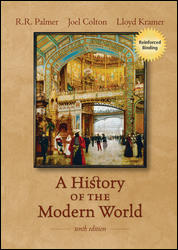
History of the Modern World, 10th Edition (Palmer)Chapter 3: Economic Renewal and Wars of Religon, 1560-1648Chapter OverviewIn the century after 1560, Europeans fought religious wars that pitted Catholics against Protestants. These conflicts also involved political, constitutional, economic, and social questions. At the same time, Europe was transformed by its contacts with Africa, Asia, and the New World and the birth of capitalism. Trade expanded, new social classes emerged, and Europeans speculated about the diversity of human cultures and races. The Portuguese were the first to establish a great trading empire along the coast of Africa. Columbus paved the way for a Spanish empire with the discovery of the New World. A commercial revolution within Europe itself took place against the background of an expanding population and a price revolution. The landed aristocracy, the peasantry, the middle classes, and the urban poor became the predominant social classes of European society under the new economic system, sometimes with the encouragement or discouragement of governments. Meanwhile, Philip II of Spain attempted to uphold not only his imperial control of his vast holdings, but also to enforce Catholicism within his empire. In France, the wars of religion were as much a feudal rebellion against the centralizing tendencies of the monarchy as they were conflicts between Huguenots and Catholics. In Germany, the Thirty Years’ War pitted member states against the emperor, and turned into an international conflict involving much of Europe. With the resolution of the Thirty Years’ War, religious divisions would no longer be used in the struggle for territory, wealth, or strategic alliances among European sovereign powers. |  |















